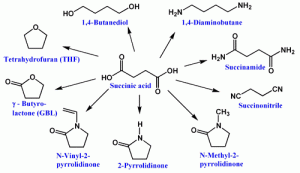Research
Research areas of interest: Metabolic engineering of microbes, Microbial fermentation, Biofuels, Microbial diversity, Anaerobes, Development of new molecular tools, Synthetic biology.
♦ Current Research Projects
• Production of Succinic acid (Succinate)
Succinate has been recognized by U.S. Dept. of Energy (DoE) amongst top 12 valuable chemicals. Recent estimates of the market potential for succinic acid and its immediate derivatives were projected to be as much as 245 × 10(3) ton/year, with a market size for succinic acid derived polymers up to 25 × 10(6) ton/year. Succinic acid and its derivatives has wide market applications in food, pharmaceutical and polymer industry. Succinate has been produced mostly by petrochemical based processes. With the rising cost of petroleum and depleting resources, interest has been raised in fermentative production of succinate.
I have been working on ‘Metabolic engineering of Escherichia coli’ for producing succinate using glucose and various other sugars derived from renewable resources. We have developed an engineered E. coli strain that produces succinate anaerobically with maximum theoretical yield of 1.6-1.7 mol/mol glucose. Recently, we demonstrated efficient succinate production under aerobic conditions using soybean feedstock sugars. Further research is focused on strain improvement, optimization of fermentation parameters and scale up demonstration.
Link: Soybeans a sources of valuable chemicals
• Precise genome modification in E. coli
An important molecular tool in functional genomics studies is the targeted inactivation of any gene of interest. A number of methods, many of which utilize recombinase, have been developed that allow the disruption of specific target genes in E. coli. However, the requirement of extra in vitro manipulation steps or the residual presence of scar in the host chromosome makes such methods inappropriate for certain purposes. To overcome these disadvantages, we have developed a method for precise and scarless genome modification in E. coli.



